Xiaobin Wang
U-Fold: Dynamic Intent-Aware Context Folding for User-Centric Agents
Jan 26, 2026Abstract:Large language model (LLM)-based agents have been successfully deployed in many tool-augmented settings, but their scalability is fundamentally constrained by context length. Existing context-folding methods mitigate this issue by summarizing past interactions, yet they are typically designed for single-query or single-intent scenarios. In more realistic user-centric dialogues, we identify two major failure modes: (i) they irreversibly discard fine-grained constraints and intermediate facts that are crucial for later decisions, and (ii) their summaries fail to track evolving user intent, leading to omissions and erroneous actions. To address these limitations, we propose U-Fold, a dynamic context-folding framework tailored to user-centric tasks. U-Fold retains the full user--agent dialogue and tool-call history but, at each turn, uses two core components to produce an intent-aware, evolving dialogue summary and a compact, task-relevant tool log. Extensive experiments on $τ$-bench, $τ^2$-bench, VitaBench, and harder context-inflated settings show that U-Fold consistently outperforms ReAct (achieving a 71.4% win rate in long-context settings) and prior folding baselines (with improvements of up to 27.0%), particularly on long, noisy, multi-turn tasks. Our study demonstrates that U-Fold is a promising step toward transferring context-management techniques from single-query benchmarks to realistic user-centric applications.
AutoForge: Automated Environment Synthesis for Agentic Reinforcement Learning
Dec 28, 2025Abstract:Conducting reinforcement learning (RL) in simulated environments offers a cost-effective and highly scalable way to enhance language-based agents. However, previous work has been limited to semi-automated environment synthesis or tasks lacking sufficient difficulty, offering little breadth or depth. In addition, the instability of simulated users integrated into these environments, along with the heterogeneity across simulated environments, poses further challenges for agentic RL. In this work, we propose: (1) a unified pipeline for automated and scalable synthesis of simulated environments associated with high-difficulty but easily verifiable tasks; and (2) an environment level RL algorithm that not only effectively mitigates user instability but also performs advantage estimation at the environment level, thereby improving training efficiency and stability. Comprehensive evaluations on agentic benchmarks, including tau-bench, tau2-Bench, and VitaBench, validate the effectiveness of our proposed method. Further in-depth analyses underscore its out-of-domain generalization.
Qwen3Guard Technical Report
Oct 16, 2025Abstract:As large language models (LLMs) become more capable and widely used, ensuring the safety of their outputs is increasingly critical. Existing guardrail models, though useful in static evaluation settings, face two major limitations in real-world applications: (1) they typically output only binary "safe/unsafe" labels, which can be interpreted inconsistently across diverse safety policies, rendering them incapable of accommodating varying safety tolerances across domains; and (2) they require complete model outputs before performing safety checks, making them fundamentally incompatible with streaming LLM inference, thereby preventing timely intervention during generation and increasing exposure to harmful partial outputs. To address these challenges, we present Qwen3Guard, a series of multilingual safety guardrail models with two specialized variants: Generative Qwen3Guard, which casts safety classification as an instruction-following task to enable fine-grained tri-class judgments (safe, controversial, unsafe); and Stream Qwen3Guard, which introduces a token-level classification head for real-time safety monitoring during incremental text generation. Both variants are available in three sizes (0.6B, 4B, and 8B parameters) and support up to 119 languages and dialects, providing comprehensive, scalable, and low-latency safety moderation for global LLM deployments. Evaluated across English, Chinese, and multilingual benchmarks, Qwen3Guard achieves state-of-the-art performance in both prompt and response safety classification. All models are released under the Apache 2.0 license for public use.
Towards General Agentic Intelligence via Environment Scaling
Sep 16, 2025Abstract:Advanced agentic intelligence is a prerequisite for deploying Large Language Models in practical, real-world applications. Diverse real-world APIs demand precise, robust function-calling intelligence, which needs agents to develop these capabilities through interaction in varied environments. The breadth of function-calling competence is closely tied to the diversity of environments in which agents are trained. In this work, we scale up environments as a step towards advancing general agentic intelligence. This gives rise to two central challenges: (i) how to scale environments in a principled manner, and (ii) how to effectively train agentic capabilities from experiences derived through interactions with these environments. To address these, we design a scalable framework that automatically constructs heterogeneous environments that are fully simulated, systematically broadening the space of function-calling scenarios. We further adapt a two-phase agent fine-tuning strategy: first endowing agents with fundamental agentic capabilities, then specializing them for domain-specific contexts. Extensive experiments on agentic benchmarks, tau-bench, tau2-Bench, and ACEBench, demonstrate that our trained model, AgentScaler, significantly enhances the function-calling capability of models.
Memp: Exploring Agent Procedural Memory
Aug 08, 2025Abstract:Large Language Models (LLMs) based agents excel at diverse tasks, yet they suffer from brittle procedural memory that is manually engineered or entangled in static parameters. In this work, we investigate strategies to endow agents with a learnable, updatable, and lifelong procedural memory. We propose Memp that distills past agent trajectories into both fine-grained, step-by-step instructions and higher-level, script-like abstractions, and explore the impact of different strategies for Build, Retrieval, and Update of procedural memory. Coupled with a dynamic regimen that continuously updates, corrects, and deprecates its contents, this repository evolves in lockstep with new experience. Empirical evaluation on TravelPlanner and ALFWorld shows that as the memory repository is refined, agents achieve steadily higher success rates and greater efficiency on analogous tasks. Moreover, procedural memory built from a stronger model retains its value: migrating the procedural memory to a weaker model yields substantial performance gains.
Agentic Knowledgeable Self-awareness
Apr 04, 2025Abstract:Large Language Models (LLMs) have achieved considerable performance across various agentic planning tasks. However, traditional agent planning approaches adopt a "flood irrigation" methodology that indiscriminately injects gold trajectories, external feedback, and domain knowledge into agent models. This practice overlooks the fundamental human cognitive principle of situational self-awareness during decision-making-the ability to dynamically assess situational demands and strategically employ resources during decision-making. We propose agentic knowledgeable self-awareness to address this gap, a novel paradigm enabling LLM-based agents to autonomously regulate knowledge utilization. Specifically, we propose KnowSelf, a data-centric approach that applies agents with knowledgeable self-awareness like humans. Concretely, we devise a heuristic situation judgement criterion to mark special tokens on the agent's self-explored trajectories for collecting training data. Through a two-stage training process, the agent model can switch between different situations by generating specific special tokens, achieving optimal planning effects with minimal costs. Our experiments demonstrate that KnowSelf can outperform various strong baselines on different tasks and models with minimal use of external knowledge. Code is available at https://github.com/zjunlp/KnowSelf.
SynWorld: Virtual Scenario Synthesis for Agentic Action Knowledge Refinement
Apr 04, 2025Abstract:In the interaction between agents and their environments, agents expand their capabilities by planning and executing actions. However, LLM-based agents face substantial challenges when deployed in novel environments or required to navigate unconventional action spaces. To empower agents to autonomously explore environments, optimize workflows, and enhance their understanding of actions, we propose SynWorld, a framework that allows agents to synthesize possible scenarios with multi-step action invocation within the action space and perform Monte Carlo Tree Search (MCTS) exploration to effectively refine their action knowledge in the current environment. Our experiments demonstrate that SynWorld is an effective and general approach to learning action knowledge in new environments. Code is available at https://github.com/zjunlp/SynWorld.
An Adaptive Framework for Generating Systematic Explanatory Answer in Online Q&A Platforms
Oct 23, 2024



Abstract:Question Answering (QA) systems face challenges in handling complex questions that require multi-domain knowledge synthesis. The naive RAG models, although effective in information retrieval, struggle with complex questions that require comprehensive and in-depth answers. The pioneering task is defined as explanatory answer generation, which entails handling identified challenges such as the requirement for comprehensive information and logical coherence within the generated context. To address these issues, we refer to systematic thinking theory and propose SynthRAG, an innovative framework designed to enhance QA performance. SynthRAG improves on conventional models by employing adaptive outlines for dynamic content structuring, generating systematic information to ensure detailed coverage, and producing customized answers tailored to specific user inquiries. This structured approach guarantees logical coherence and thorough integration of information, yielding responses that are both insightful and methodically organized. Empirical evaluations underscore SynthRAG's effectiveness, demonstrating its superiority in handling complex questions, overcoming the limitations of naive RAG models, and significantly improving answer quality and depth. Furthermore, an online deployment on the Zhihu platform revealed that SynthRAG's answers achieved notable user engagement, with each response averaging 5.73 upvotes and surpassing the performance of 79.8% of human contributors, highlighting the practical relevance and impact of the proposed framework. Our code is available at https://github.com/czy1999/SynthRAG .
Benchmarking Agentic Workflow Generation
Oct 10, 2024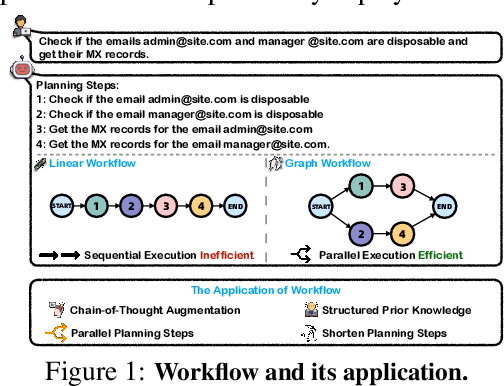
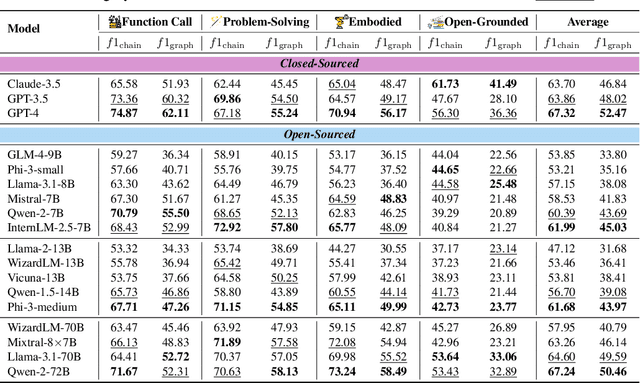
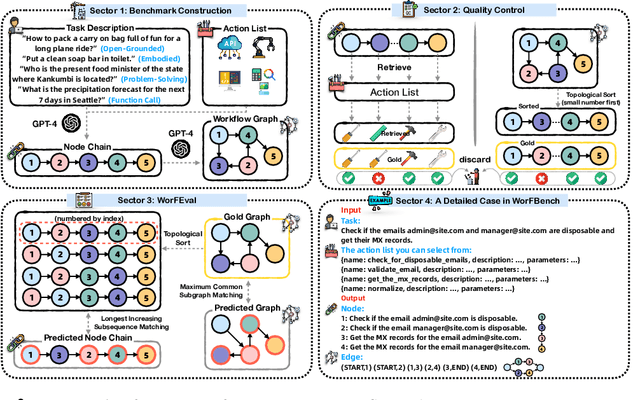
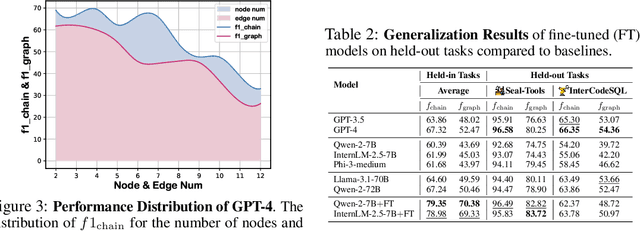
Abstract:Large Language Models (LLMs), with their exceptional ability to handle a wide range of tasks, have driven significant advancements in tackling reasoning and planning tasks, wherein decomposing complex problems into executable workflows is a crucial step in this process. Existing workflow evaluation frameworks either focus solely on holistic performance or suffer from limitations such as restricted scenario coverage, simplistic workflow structures, and lax evaluation standards. To this end, we introduce WorFBench, a unified workflow generation benchmark with multi-faceted scenarios and intricate graph workflow structures. Additionally, we present WorFEval, a systemic evaluation protocol utilizing subsequence and subgraph matching algorithms to accurately quantify the LLM agent's workflow generation capabilities. Through comprehensive evaluations across different types of LLMs, we discover distinct gaps between the sequence planning capabilities and graph planning capabilities of LLM agents, with even GPT-4 exhibiting a gap of around 15%. We also train two open-source models and evaluate their generalization abilities on held-out tasks. Furthermore, we observe that the generated workflows can enhance downstream tasks, enabling them to achieve superior performance with less time during inference. Code and dataset will be available at https://github.com/zjunlp/WorFBench.
Effective Demonstration Annotation for In-Context Learning via Language Model-Based Determinantal Point Process
Aug 04, 2024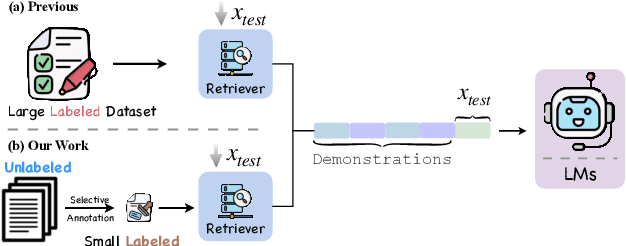
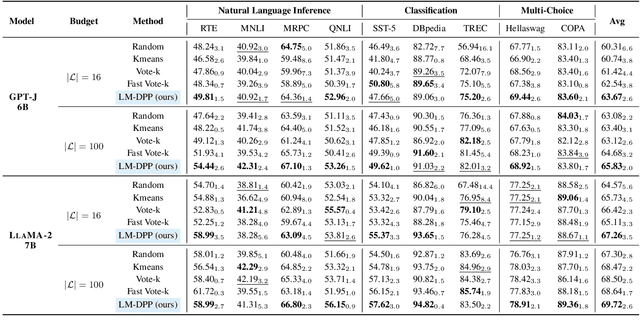

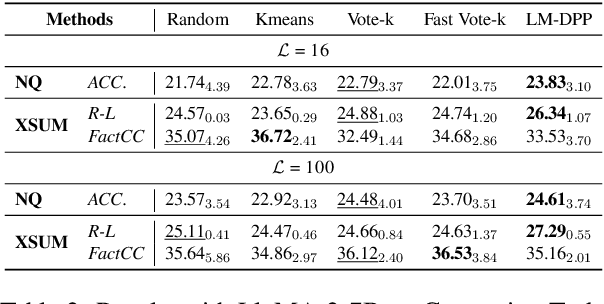
Abstract:In-context learning (ICL) is a few-shot learning paradigm that involves learning mappings through input-output pairs and appropriately applying them to new instances. Despite the remarkable ICL capabilities demonstrated by Large Language Models (LLMs), existing works are highly dependent on large-scale labeled support sets, not always feasible in practical scenarios. To refine this approach, we focus primarily on an innovative selective annotation mechanism, which precedes the standard demonstration retrieval. We introduce the Language Model-based Determinant Point Process (LM-DPP) that simultaneously considers the uncertainty and diversity of unlabeled instances for optimal selection. Consequently, this yields a subset for annotation that strikes a trade-off between the two factors. We apply LM-DPP to various language models, including GPT-J, LlaMA, and GPT-3. Experimental results on 9 NLU and 2 Generation datasets demonstrate that LM-DPP can effectively select canonical examples. Further analysis reveals that LLMs benefit most significantly from subsets that are both low uncertainty and high diversity.
 Add to Chrome
Add to Chrome Add to Firefox
Add to Firefox Add to Edge
Add to Edge